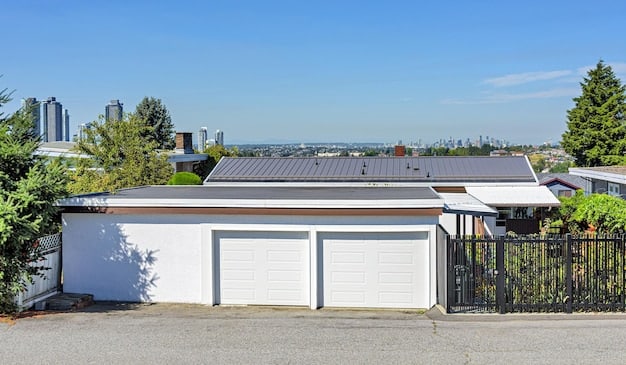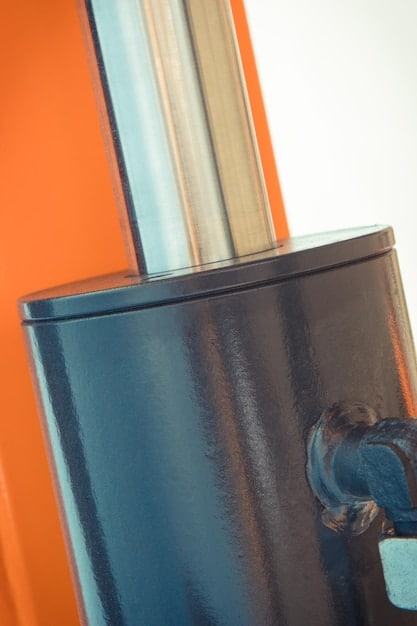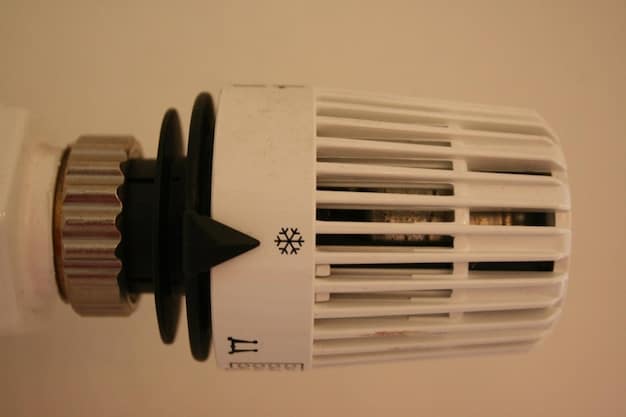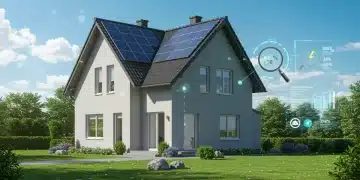Are Tankless Water Heaters the Energy-Efficient Choice for 2025?

Tankless water heaters offer on-demand hot water, potentially reducing energy waste by eliminating the need to heat and store water continuously, making them a consideration for energy efficiency in 2025, though factors like usage patterns and upfront costs must be weighed.
Are you considering upgrading your water heater and wondering if tankless is the way to go? The energy efficiency benefits of tankless water heaters: Are they the right choice for energy efficiency in 2025? depend on several factors which we will explore.
Understanding Tankless Water Heaters and Their Functionality
Tankless water heaters, also known as on-demand water heaters, differ significantly from traditional tank water heaters. Traditional water heaters heat and store water continuously, while tankless units only heat water when there is a demand.
This difference in functionality leads to various implications for energy consumption, cost savings, and overall performance. Let’s delve deeper into how these systems work.
How Tankless Water Heaters Work
Tankless water heaters use high-powered burners or electric coils to quickly heat water as it passes through the unit. When a hot water tap is turned on, cold water travels through a pipe into the unit.
A flow sensor detects the water flow and activates the heating element. The water is heated to the desired temperature and then sent to the faucet or appliance.
Key Components of a Tankless System
- Heat Exchanger: This is where the water is rapidly heated. It’s designed for high efficiency and quick temperature transfer.
- Burner or Electric Coil: Depending on the type, either a gas burner or an electric coil provides the heat source.
- Flow Sensor: This critical component detects when water is flowing and activates the heating process.
- Control Panel: This allows users to set the desired water temperature and monitors the system’s performance.
The ability of tankless water heaters to heat water only when needed eliminates the standby heat loss associated with traditional tank models, potentially leading to significant energy savings.

Energy Efficiency: Tankless vs. Traditional Water Heaters
One of the primary reasons homeowners consider tankless water heaters is their potential for increased energy efficiency. But how do they stack up against traditional tank water heaters in real-world scenarios?
Let’s examine the factors that contribute to the energy efficiency of tankless systems and compare them with their tank-based counterparts.
Standby Heat Loss Comparison
Traditional tank water heaters continuously heat water, even when there is no demand. This results in standby heat loss, where heat dissipates from the tank into the surrounding environment.
Tankless water heaters eliminate this standby heat loss by only heating water on demand. This can lead to significant energy savings, especially in households with irregular hot water usage patterns.
Energy Factor (EF) Ratings
The Energy Factor (EF) is a measure of a water heater’s overall energy efficiency. It takes into account standby losses, recovery efficiency, and cycling losses.
Tankless water heaters generally have higher EF ratings than traditional tank models. For example, a tankless water heater might have an EF rating of 0.90 or higher, while a standard tank water heater might have an EF rating of 0.60 to 0.70.
Real-World Energy Savings
While tankless water heaters have the potential for significant energy savings, the actual savings can vary depending on several factors.
- Hot Water Usage: Households with low to moderate hot water usage tend to benefit the most from tankless systems.
- Climate: In warmer climates, where the incoming water temperature is higher, tankless heaters operate more efficiently.
- Household Size: Larger households with high hot water demand might not see as much savings, as the tankless unit may need to work harder to keep up with demand.
Ultimately, the energy efficiency benefits of tankless water heaters are most pronounced in specific usage scenarios and should be evaluated based on individual household needs.
Factors Influencing Tankless Water Heater Efficiency in 2025
As technology advances, the energy efficiency of tankless water heaters continues to improve. Several factors are expected to influence their efficiency in 2025 and beyond.
These factors include technological advancements, regulatory standards, and consumer behavior. Let’s take a closer look at each of these aspects.
Technological Advancements
Manufacturers are continuously innovating to improve the efficiency of tankless water heaters. Some of the key technological advancements include:
- Improved Heat Exchangers: More efficient heat exchangers can transfer heat to the water more quickly and with less energy loss.
- Advanced Burner Technology: Modulating burners can adjust the heat output based on demand, further improving efficiency.
- Smart Controls: Smart controls and connectivity allow users to monitor and optimize their water heating usage.
Regulatory Standards and Incentives
Government regulations and incentives play a crucial role in promoting energy efficiency. In the United States, the Department of Energy (DOE) sets minimum energy efficiency standards for water heaters.
Additionally, many states and utility companies offer rebates and incentives for homeowners who install energy-efficient appliances, including tankless water heaters.
Consumer Behavior and Usage Patterns
Consumer behavior and usage patterns can significantly impact the energy efficiency of tankless water heaters. Simple changes in habits, such as taking shorter showers and fixing leaky faucets, can make a big difference.
Additionally, understanding how to properly use and maintain a tankless water heater can help maximize its efficiency and lifespan.
By considering these factors, homeowners can make informed decisions about whether a tankless water heater is the right choice for their needs and how to optimize its energy efficiency.
Cost Analysis: Tankless Water Heaters in the Long Run
While tankless water heaters offer potential energy savings, it’s essential to consider the overall cost, including upfront expenses, installation fees, and long-term operational costs.
A comprehensive cost analysis can help homeowners determine if a tankless system is a financially sound investment. Let’s break down the various cost components.
Upfront Costs and Installation
Tankless water heaters typically have higher upfront costs than traditional tank models. The price of the unit itself can be significantly higher, and installation can also be more expensive.
Installation often requires upgrades to gas lines or electrical systems to accommodate the higher power requirements of tankless units.
Operational Costs and Energy Savings
The primary operational cost of a water heater is the energy required to heat the water. Tankless water heaters can lead to lower energy bills due to their on-demand heating capabilities.
However, the actual savings depend on hot water usage patterns and energy prices. In some cases, the energy savings can offset the higher upfront costs over time.
Maintenance and Longevity
Tankless water heaters generally have a longer lifespan than traditional tank models. They can last 20 years or more with proper maintenance, while tank heaters typically last 10-15 years.
Regular maintenance, such as flushing the heat exchanger to remove mineral buildup, is essential to maintain efficiency and prolong the lifespan of the unit.

Pros and Cons: Making the Right Choice for Your Home
Deciding whether to switch to a tankless water heater involves weighing the various pros and cons. Each home and family has unique needs.
Understanding these advantages and disadvantages can help homeowners make an informed decision. Let’s consider the key points.
Advantages of Tankless Water Heaters
- Energy Efficiency: Tankless heaters eliminate standby heat loss, potentially reducing energy consumption.
- Endless Hot Water: They provide a continuous supply of hot water, unlike tank models that can run out.
- Space Saving: Tankless units are compact and can be mounted on walls, saving valuable floor space.
Disadvantages of Tankless Water Heaters
- Higher Upfront Costs: Tankless heaters typically have higher purchase and installation costs.
- Flow Rate Limitations: They may struggle to supply hot water to multiple fixtures simultaneously.
- Installation Requirements: Some homes may require gas line or electrical upgrades for installation.
Is a Tankless System Right for You?
The decision to switch to a tankless water heater depends on your specific needs and circumstances.
If you have low to moderate hot water usage, value energy efficiency, and don’t mind the higher upfront costs, a tankless system could be a good fit. However, if you have high hot water demand or are on a tight budget, a traditional tank heater might be a better option.
Carefully consider your hot water needs, budget, and home’s infrastructure before making a decision.
Future Trends in Water Heating Technology
The water heating industry is continually evolving, with new technologies and innovations emerging regularly. Staying informed about these trends can help homeowners make future-proof decisions.
From smart home integration to alternative energy sources, the future of water heating looks promising. Let’s explore some of these trends.
Smart Home Integration
Smart home technology is becoming increasingly prevalent, and water heaters are no exception. Smart tankless water heaters can connect to home Wi-Fi networks, allowing users to:
- Monitor Water Usage: Track hot water consumption and identify opportunities for savings.
- Adjust Temperature Remotely: Control water temperature from a smartphone or tablet.
- Receive Alerts: Get notified of potential issues, such as leaks or maintenance needs.
Alternative Energy Sources
As the world moves towards more sustainable energy sources, alternative energy-powered water heaters are gaining traction.
Solar water heaters use solar panels to heat water, while heat pump water heaters extract heat from the surrounding air. These options can significantly reduce reliance on fossil fuels.
Hybrid Systems
Hybrid water heaters combine the benefits of both tank and tankless systems. These units typically use a small tank to store preheated water, which is then heated on demand by a tankless unit.
This approach can provide a balance between energy efficiency and consistent hot water supply.
By keeping an eye on these future trends, homeowners can make informed decisions about their water heating systems and take advantage of the latest innovations.
| Key Point | Brief Description |
|---|---|
| 💡 On-Demand Heating | Tankless heaters only heat water when needed, reducing standby heat loss. |
| 💰 Cost Factors | Consider upfront costs, installation fees, and long-term energy savings. |
| 🔧 Maintenance Needs | Regular maintenance ensures efficiency and prolongs the lifespan of tankless units. |
| 🌐 Smart Integration | Smart tankless heaters offer remote monitoring and control via Wi-Fi. |
Frequently Asked Questions
▼
Yes, tankless water heaters are generally more energy efficient than traditional tank heaters because they only heat water on demand, eliminating standby heat loss.
▼
Tankless water heaters can last 20 years or more with proper maintenance, which is significantly longer than traditional tank models that typically last 10-15 years.
▼
Installation may require upgrades to gas lines or electrical systems to accommodate the higher power requirements of tankless units. Professional installation is typically recommended.
▼
Some tankless models may struggle to supply hot water to multiple fixtures at the same time, especially if the demand is high. Consider the flow rate when choosing a unit.
▼
Yes, many states and utility companies offer rebates and incentives for homeowners who install energy-efficient appliances, including tankless water heaters, to encourage energy conservation.
Conclusion
In conclusion, whether tankless water heaters: Are they the right choice for energy efficiency in 2025? is a question that requires careful consideration of individual needs, energy consumption patterns, and budget constraints to determine if it truly fits your lifestyle.





